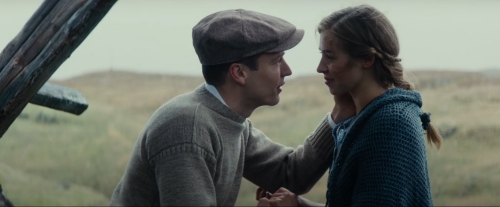The Road Dance (Adams, 2021)
It is hard for me to fault The Road Dance for being about what it is about, but …
I have seen so many stories over the yers about women being assaulted, women being beaten, women being raped, I live in an age on numb indifference, and that’s a place I don’t want to be.
Is that the movie’s fault? The majority of reviews I have seen praise Hermione Corfield for her sensitive performance as Kirsty Macleod, and I agree. Kirsty is young and in love and loved in return by Murdo (Will Fletcher). But Murdo is called to go to war, and war parts young lovers, sometimes for a season, sometimes for longer. The titular “road dance” is a celebration in Kirsty’s village, a sort of wartime prom night where idyllic fantasies can be held for a moment before the rest of our lives begin.
The rest of Kirsty’s life begins with a rape, and if I’m blunt about that face, I am in part because the film’s marketing is distastefully coy, opting to call it a “tragic turn” or a “fateful event.” That kind of stuff. I get that it must be hard to write a plot summary about rape that makes the movie sound appealing or entertaining, but maybe that’s my point. If using the word is too shocking or distressing, what are we to make of the content. And this event happens early, so it is not as though the synopsis is trying to avoid spoilers.
Who committed the act is a spoiler, so the less said about it the better. The second half of the film juxtaposes Kirsty’s unwanted pregnancy with Murdo’s fight to stay alive. Will he come home to her? Does she want him to? If he does, will he be shocked at what he finds?
This is, by any calculation, some dark material. Perhaps that darkness works better in literary form where a novel can describe the psychological torments that accompany the physical ones. The Road Dance depicts a world in which shaming the victim is par for the course and the comingling of patriarchy and religious privilege is an accepted (f often resented) way of life.
But if I am reluctant to simply dismiss out of hand a situation that feels as old and familiar as The Scarlet Letter, maybe that is because I know that not everyone has read The Scarlet Letter — or seen The Accused — or watched two decades worth of Law and Order: SVU. Works that depict sexual assault as truly horrible, psychologically devastating, and socially life-altering are a necessary witness to the pernicious impact of living in a sinful, fallen world. As long as a film is striving to be honest about its subject matter, I can’t seriously downvote it for saying rape is bad. I hope it finds the right audience — those occupying the narrow space between uninformed and hardened of heart. I can’t exactly blame potential viewers, though, for not wanting to sit through two hours of human misery simply to have the idea confirmed that love is better than cruelty and that violence often begets consequences that ripple outward from its point of origin, leaving an ever-widening circle of hurt people in its wake.

